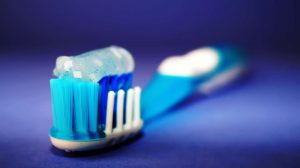4 Benefits of Flossing Before Brushing
When it comes to your oral health routine, you likely already know that brushing and flossing are essential daily habits. As any dentist will tell you, brushing your teeth twice each day and flossing at least once will help keep your teeth healthy, clean and cavity-free.
But what does this daily routine actually look like? Should you floss before or after brushing? Are there advantages to mixing up your dental hygiene routine? We’re here to help, with some straightforward answers to all your questions!

Should You Floss Before Or After Brushing Teeth?
Believe it or not, there is an ideal flow of events to achieve optimum oral hygiene. According to research published in the American Academy of Periodontology’s Journal of Periodontology, flossing before brushing is the best way to ensure you’re getting rid of pesky dental plaque.
The study found that participants who flossed before brushing had a significantly lower amount of plaque on their teeth and in their mouth after completing their oral hygiene routine, compared to the brush-then-floss group.
If you’ve been a brush-then-flosser all these years, don’t be dismayed. Combining flossing and brushing on a daily basis is still an effective way to keep your mouth clean and healthy. If you’re looking for ways to improve your oral hygiene and help keep cavities at bay, a simple restructure of your daily sequence can have some powerful health benefits including reducing gum disease, tooth decay, plague risk, and tooth pain. We’ll dive deeper into why this is the case below.
4 Benefits of Flossing Before Brushing
As research has discovered, flossing before brushing has some lasting health benefits. Simply flipping the order in which you brush your teeth can impact your oral health in a number of ways:
- Clean deeply: Flossing is an effective way to loosen bacteria, food debris, and particles that are stuck between your teeth. If left to harden over just a 24- or 36-hour period, this plaque bacteria can quickly start to damage or decay your teeth and turn into a health risk. Flossing rids all the tight spaces in your mouth of this plaque. Brushing and rinsing can further clear particles out.
- Enhance fluoride impact: Fluoride is a mineral found in many dental products, including most adult toothpaste. In order to reap the rewards of fluoride, you want it to stay in your mouth as long as possible. With plaque and bacteria already partially removed through flossing, your teeth are more ready to absorb the fluoride. As a bonus tip: avoid rinsing or using mouth wash immediately after brushing — let the toothpaste residue sit for a little while first.
- Prevent gum disease: Gum disease can start to occur when there’s an overload of bacteria on the surface of your teeth. This is often a result of skipping dental cleaning and having poor daily dental hygiene — for example, not brushing or flossing regularly. Gum disease can include symptoms like bleeding gums, loose teeth, tender gums, or bad breath. Flossing before brushing helps to get rid of more bacteria and reduces your risk of gum disease in the long run.
- Reveal areas that need attention: Break out the floss before loading up your toothbrush, and you might notice a few extra details about your teeth. For example, flossing can sometimes help you spot some heavier particle debris or an area that’s particularly sensitive, such as your wisdom teeth. You might even notice some blood on your floss – a result of tender gums according to the American Dental Association. These signs can guide you toward areas that need some extra attention while you brush.
Take Care of Your Teeth at Hamilton Healthcare
Whether you floss or brush first, a healthy daily routine should be supplemented by regular dental cleanings and check-ups. When you’re in need of access to affordable family dental care services, Hamilton Healthcare Center is here to help. We provide high-quality dental care for kids and adults. We’re committed to helping everyone in our community stay strong and healthy through our multilingual and multicultural services.
Give us a call or contact us online today to set up your next appointment.
How to Keep Your Kid’s Teeth Clean
Children’s Dental Care
 As soon as the first tooth appears, parents should start thinking about their infant’s dental hygiene. As they get older, parents should teach their children how to maintain healthy teeth.
As soon as the first tooth appears, parents should start thinking about their infant’s dental hygiene. As they get older, parents should teach their children how to maintain healthy teeth.
Good oral hygiene is critical to your child’s overall well-being. Gum disease is the leading risk factor for heart disease, diabetes and other conditions. Whether it’s to maintain a great smile or prevent disease, follow the tips below to keep your kid’s teeth in good shape. In celebration of National Children’s Dental Health Month (February 2018), we’d like to share some tips for you to try with your family.
Tips To Try
Use Fluoride
Once the baby grows teeth, start brushing them using an infant toothbrush. Make sure to use toothpaste that has a bit of fluoride. Brush using a very small amount. Fluoride strengthens your kid’s tooth enamel and helps repair any signs of damage to the teeth. Buy fluoride toothpaste that has the ADA (American Dental Association) seal of approval.
If you’re using infant toothpaste with no fluoride, still use a tiny amount, because you want to minimize how much toothpaste they swallow.
Brush 2 Minutes, 2 Times a Day
Two minutes is how long your kids should brush their teeth, two times a day. You can make it fun for the kids by using a timer. Think of it as splitting the child’s mouth into four portions: top-right, top-left, bottom-right and bottom-left. Then, let your kid brush each portion for around 30 seconds.
Floss Regularly
The earlier you can teach your kids to floss, the better. It’s good to start once they grow two teeth that touch each other — usually at the age of two. Begin with small interdental brushes. These will help your kid learn the movements of brushing in and out of teeth to help prevent the build-up of plaque.
Show Them How To
Kids learn by watching, so allow them to watch you brush. Make sure you’re brushing correctly in a circular motion on the teeth. Don’t use water to rinse your mouth. Spit out the toothpaste, but don’t use water, as you’ll be washing out valuable fluoride. It’s important that you supervise your kid as they brush until they reach the age of seven.
Make Dental Appointments Fun
Never instill fear in your kid about visiting the dentist. The dentist should inspect your baby’s teeth from an early age, because it will help them understand everything that’s going on. Dental check-ups should be done every six months for kids. Don’t forget to talk to your dentist about fluoride use — especially after the age of two.
Feed Them Low Sugar Food
Tooth decay is one of the leading causes of children’s hospital admissions before the age of nine, and sugar is usually the main culprit. Fizzy drinks contain large doses of sugar and acids that erode the surfaces of teeth. Never give your kids sugary drinks in baby bottles, because the sugar stays in contact with the teeth for longer, causing dental decay. Feed them low-sugar foods like milk from 12 months to 2 years of age.
Come to Us!
When you need access to comprehensive, affordable family dental services, contact Hamilton Healthcare Center. We’re a multilingual, multicultural, family-centered medical home. If you’ve been asking yourself, “Where can I find a kids’ dentist near me?” then you have come to the right place. Call us at (717) 232-9971 today.


